Items
Search full-text
“The Australian Government announced a National Autism Strategy in 2022”
-
"Royal Commission on Human Relationships" In 1977, the Royal Commission on Human Relationships noted the legal and human rights of handicapped children and adults.
-
"Declaration on the Rights of Disabled Persons adopted in 1975" The 1960s and 1970s saw major changes in people’s attitudes towards disability. Stemming from the growth of the human rights movement and the introduction of normalisation theory internationally, Australia signed key human rights declarations of people with disabilities, the Declaration on the Rights of Disabled Persons (adopted in 1975). The Declaration argued that disabled people deserve to live lives “as normal and full as possible”.
-
"The Australia Council establishes the Community Arts Committee in 1973 and the Community Arts Board in 1978" The Australia Council established the Community Arts Committee in 1973 and the Community Arts Board in 1978. The purpose of the latter was to encourage wider participation in the arts, especially for groups with little social capital. The Board was “the first funding body to identify the community arts phenomenon and respond with definition and policy." This occurred under the directorship of Rosalie Bower, the first director of the Community Arts Board, who wrote in a paper entitled 'The Case for a Community Arts Centre': “The activities within a centre should be accessible to children, aged people, the physically handicapped, ethnic groups and those whose time is severely restricted by work and family ties. The activities supplied by the centre should be conducted free from competitive elements which otherwise might discourage people from participation, and they must be inexpensive and accessible at almost any time. They must not pre-suppose education or income levels which would cut them off from any section of the community.'" (Australia Council 1979/1980 Annual Report, page 32)
-
“The Mouth and Foot Painting Artists starts in Australia in 1971” The Mouth and Foot Painting Artists (MFPA) started in Australia in 1971. The roots of the international organisation of mouth and food painting artists go back to the 1950s in Europe.
-
“Australia Council grants funding for projects about disability or for disabled participants throughout the 1970s” The 1974/75 Australia Council annual report states $1,350 in funding granted to Spectrum Films (NSW) to "develop a screenplay for a feature film of the social pressures on a deaf mute”, as well as a $4,500 travel/study grant to Lloyd Nickson (QLD) "to attend summer schools in children's theatre and theatre for deaf children (USA and UK) for six months". In the same year, the Council reported Bryan Gracey as one of numerous individuals in receipt of Experimental Film funding for his short film ‘The World of a Blind Child’ (1975) about the emotional and physical difficulties 10-year-old Peter faces and how he navigates his disability. In the 1974/75 financial year, Australia Council’s crafts board awarded $1,288 to the Wheelchair and Disabled Association (NSW) for "Jewellery making tools and equipment". The 1979/1980 Australia Council annual report describes the following funding: "As in previous years, a grant was given to the Braille and Talking Book Library for its Braille Book of the Year.”
-
“Australia Council praises NSW Theatre of the Deaf and provides some funding to the Deaf theatres throughout the 1970s” The 1976/77 Australia Council annual report stated: "The NSW Theatre of the Deaf is a significant achievement. The only funded organisation in Australia working in nonverbal theatre, its production of King Lear received widespread praise. This company is now accepted as operating in a legitimate area of theatre rather than performing mime works for the deaf. This offers wide scope for innovation." The Council’s 1977/78 annual report recorded that it granted funding to the NSW Theatre of the Deaf “towards salaries of artistic director, deaf director, and tutors’ fees in 1978” for $25,000; the “presentation of theatre pieces (mime, clowning, puppetry) in public performance” for $2,500, and “towards costs of a production in 1978” for $4,000. It also awarded $1,980 to Queensland Theatre of the Deaf “towards the cost of transporting company to Sydney for seminar with NSW Theatre of the Deaf”. Drama Resource Centre (Victoria) received $2,840 “to develop student theatre at Victoria School for Deaf Children” and $630 went to Children’s Activities Time Society (Western Australia) for the “cost of deaf mime artist, Rae Gibson, to undertake four week visit to Melbourne and Sydney to work with deaf artists”. The following annual report for 1978/79 recorded that the Council granted $25,000 to the NSW Theatre of the Deaf “towards salaries of artistic director, administrator and tutors” in 1979. The Council also awarded $1,800 to the Queensland Theatre of the Deaf towards a salary for Geoffrey Rush to work with the company in 1979. The 1979/1980 Australia Council annual report mentions funding “provided for a playwright-in-residence at the NSW Theatre of the Deaf.”
-
“Australia Council releases its first Disability Action Plan” In 1996, the Australia Council for the Arts released its first Disability Action Plan.
-
"A number of theatre companies are established in the 2000s" A number of theatre companies were established in the 2000s, particularly towards the end of the decade. Some key companies in disability theatre or inclusive arts practice to emerge in the 2000s are: Second Echo Ensemble (2005, integrated, often producing work in partnership with the Tasmanian Theatre Company), Ever After Theatre Company (2006, performers with disability), Rollercoaster Theatre Company (2007, performers with disability), DirtyFeet (2008, inclusive), and Blue Roo Theatre (2009, performers with disability).
-
“The first Focus on Ability film festival held in 2009” In 2009, the first Focus on Ability film festival was started by the CEO of NOVA Employment, Martin Wren. (NOVA is a Sydney-based disability employment service.) FOA holds events in Australia’s major cities and welcomes entries in open categories as well as a schools category and international section.
-
“Arts Access Australia releases the report Making the Journey: Arts & Disability in Australia” In 2005, Arts Access Australia commissioned a survey of the disability arts sector nationally. This survey resulted in the report, Making the Journey: Arts & Disability in Australia. The report was written by Mary Hutchison. It details 12 case study disability arts organisations.
-
“Australia signs the UN Convention on the Rights of People with Disability” In 2007, Australia signed the UN Convention on the Rights of People with Disability. The CRPD seeks to “promote, protect and ensure the full and equal enjoyment of all human rights and fundamental freedoms by all persons with disabilities”. The Convention came into effect in Australia on 16 August 2008.
-
“Arts Access Australia launches Meeting Place” Arts Access Australia launched Meeting Place in 2012, an annual forum where artists and industry leaders meet to discuss arts and disability and to network. The forum includes keynotes, panels, and workshops.
-
“Arts Access Australia launches its ‘Don’t Play Us, Pay Us’ campaign in response to 'cripping up'” In 2012, Arts Access Australia launched its ‘Don’t Play Us, Pay Us’ campaign in response to 'cripping up,' where non-disabled performers play disabled characters on stage or screen.
-
“An ABC video series explores the experiences of deaf and disabled musicians” A 2021 video series by ABC Classic featured interviews with four deaf and disabled musicians. The series, made in honour of International Day of People with Disability, explored the musicians’ experiences of the music industry.
-
“Screen producer, editor, and accessibility consultant Stephanie Dower is interviewed for Screen Queensland On Air, in an episode called How They See Us: Disability in the Screen Industry” Stephanie Dower was interviewed in 2020 for Screen Queensland On Air, in an episode called How They See Us: Disability in the Screen Industry. Dower is an editor, producer, and writer for screen. She has also worked with Get Skilled Access and as an accessibility consultant for Queenslanders with Disability Network.
-
“2023 Screen industry report ‘Disability and Screen Work in Australia’ finds disabled people fulfil a range of roles in the screen industry, despite facing prejudice and exclusion, and should be treated as experts of their access requirements” ‘Disability and Screen Work in Australia: Report for Industry’ (2023) was compiled by researchers Radha O’Meara, Laura Dunstan, Anna Debinski and Catherine Ryan. The study was supported by Melbourne Disability Institute and A2K Media. The authors summarise that disabled people fulfil a range of roles in the screen industry, despite facing prejudice and exclusion, and should be treated as experts of their access requirements. They find that “Disabled people experience a more precarious, lower paid, and less powerful position in the screen industry than their non-disabled counterparts.” O’Meara and her colleagues call for widespread change in the industry to expand access.
-
“Activism leads to a Disability Royal Commission” Decades of activism led to a 2019 Senate motion calling for a Disability Royal Commission. The first public hearing of the Royal Commission took place on 16th September, 2019 at Brisbane’s Convention and Exhibition Centre. The Commission resulted in a report in 12 volumes. Several volumes include Volume 3: Nature and extent of violence, abuse, neglect and exploitation, Volume 6: Enabling autonomy and access, Volume 7: Inclusive education, employment and housing, Volume 9: First Nations people with disability, and Volume 10: Disability services. Overall, the Commission presented “222 recommendations on how to improve laws, policies, structures and practices to ensure a more inclusive and just society that supports the independence of people with disability and their right to live free from violence, abuse, neglect and exploitation.” In 2023, the final report of the Royal Commission into Violence, Abuse, Neglect and Exploitation of People with Disability was published with 220 recommendations for a more inclusive nation to reduce exploitation, violence, abuse and neglect of people with disabilities.
- Timothy Cook
-
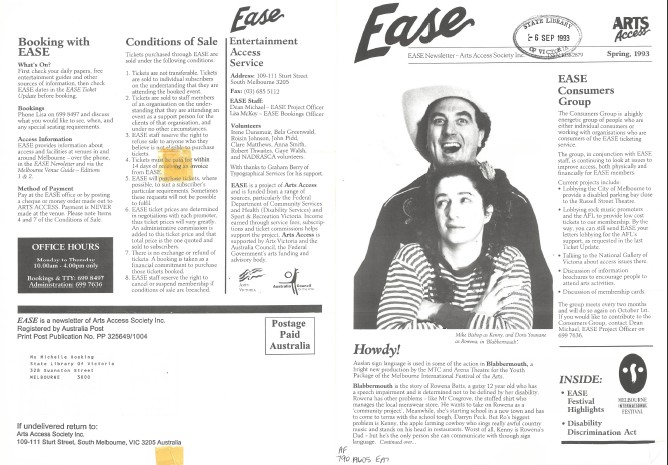 “Arts Access Victoria EASE Entertainment Access Service Newsletter Spring 1993" Arts Access Victoria EASE Entertainment Access Service Newsletter Spring 1993 - Overview of Disability Discrimination Act, EASE Consumers Group projects, Melbourne International Festival of the Arts
“Arts Access Victoria EASE Entertainment Access Service Newsletter Spring 1993" Arts Access Victoria EASE Entertainment Access Service Newsletter Spring 1993 - Overview of Disability Discrimination Act, EASE Consumers Group projects, Melbourne International Festival of the Arts -
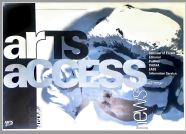 “Arts Access Arts Access News Autumn 1996” Arts Access Arts Access News Autumn 1996 – Calendar of Events, Editorial, profile of two Arts Access team - Samantha Marsh and Rhona Bester. Artistic Program – Art Day programs, Juvenile Justice programs, Supported Residential Services Program, North Fitzroy Youth Refuge project, The Heidelberg Hospital, Saturday morning Art Classes, Arts Access Library and Information Service – new technology and resources, EASE ticket service - EASE Industry Development Program Disability Seminars 1996, DADAA national one day meeting, Arts Access Membership, EASE Subscriptions and Donations, Arts Access mission statement and programs.
“Arts Access Arts Access News Autumn 1996” Arts Access Arts Access News Autumn 1996 – Calendar of Events, Editorial, profile of two Arts Access team - Samantha Marsh and Rhona Bester. Artistic Program – Art Day programs, Juvenile Justice programs, Supported Residential Services Program, North Fitzroy Youth Refuge project, The Heidelberg Hospital, Saturday morning Art Classes, Arts Access Library and Information Service – new technology and resources, EASE ticket service - EASE Industry Development Program Disability Seminars 1996, DADAA national one day meeting, Arts Access Membership, EASE Subscriptions and Donations, Arts Access mission statement and programs. -
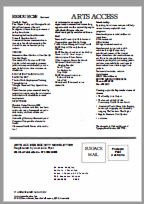 “Arts Access Victoria - Arts Access Society Inc. - Access Newsletter July 1992” Arts Access Arts Access Society Access Newsletter July 1992 - Caloola Winter Solstice Festival, establishment of Arts Access Trust, Arts Access staff changes, Senior Citizens' exhibition “Hidden Treasures”, new program - Werribee Youth Arts, DADAA national body update, P-art-ICIPATE 1992, “Stormy Weather” touring art exhibition pieces purchased for international collection, Touch, hear, see - Blind, visually impaired and sighted people can touch, hear or view, six classical European paintings, integrated band Big Bag's new CD, “Dolly”, Community Arts Network new location, resource centre update, membership.
“Arts Access Victoria - Arts Access Society Inc. - Access Newsletter July 1992” Arts Access Arts Access Society Access Newsletter July 1992 - Caloola Winter Solstice Festival, establishment of Arts Access Trust, Arts Access staff changes, Senior Citizens' exhibition “Hidden Treasures”, new program - Werribee Youth Arts, DADAA national body update, P-art-ICIPATE 1992, “Stormy Weather” touring art exhibition pieces purchased for international collection, Touch, hear, see - Blind, visually impaired and sighted people can touch, hear or view, six classical European paintings, integrated band Big Bag's new CD, “Dolly”, Community Arts Network new location, resource centre update, membership. -
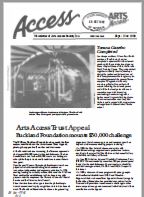 “Arts Access Victoria - Arts Access Society Inc. - Access Newsletter Sep - Nov 1992” Arts Access Arts Access Society Access Newsletter Sep - Nov 1992 - Arts Access Trust Appeal, national DADAA State Committee formed, Arts Access 'freasurer, Isi Plack toured the United States, Artist to Artist Forum, 1992 Participants Forum, The Hidden Imagination is Australia's first statewide festival of Community arts projects, “Bedrooms & Other Places” exhibition, “Stormy Weather” exhibition, projects update, resource centre update, membership.
“Arts Access Victoria - Arts Access Society Inc. - Access Newsletter Sep - Nov 1992” Arts Access Arts Access Society Access Newsletter Sep - Nov 1992 - Arts Access Trust Appeal, national DADAA State Committee formed, Arts Access 'freasurer, Isi Plack toured the United States, Artist to Artist Forum, 1992 Participants Forum, The Hidden Imagination is Australia's first statewide festival of Community arts projects, “Bedrooms & Other Places” exhibition, “Stormy Weather” exhibition, projects update, resource centre update, membership. -
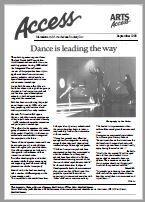 “Arts Access Victoria - Arts Access Society Inc. - Access Newsletter September 1990” Arts Access Arts Access Society Access Newsletter September 1990 – Integrated Dance Project, Participant's Report, Artists in prison report, Special Accommodation Houses Art report, art exhibitions for Mental Health Awareness Week - Inside Art-Outer Images of Inner V isions, Austin Hospital Up-date, exhibitions - "Occhio dell' Artista", "6 Women", ''.Art/Craft Works”, resource centre update, Anti-Cancer Council poster project, Senior Citizens Week 1991 Encouragement Grants, Salamanca National Script Centre distributes unpublished and published playscripts, membership
“Arts Access Victoria - Arts Access Society Inc. - Access Newsletter September 1990” Arts Access Arts Access Society Access Newsletter September 1990 – Integrated Dance Project, Participant's Report, Artists in prison report, Special Accommodation Houses Art report, art exhibitions for Mental Health Awareness Week - Inside Art-Outer Images of Inner V isions, Austin Hospital Up-date, exhibitions - "Occhio dell' Artista", "6 Women", ''.Art/Craft Works”, resource centre update, Anti-Cancer Council poster project, Senior Citizens Week 1991 Encouragement Grants, Salamanca National Script Centre distributes unpublished and published playscripts, membership -
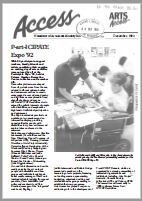 “Arts Access Victoria - Arts Access Society Inc. - Access Newsletter December 1992” Arts Access Arts Access Society Access Newsletter December 1992 – P-art-ICIPATE Expo'92, Cultural Exchange Program with China, Executive Director message, national DADAA conference, Arts Access studio – able to be hired, updates – resource centre, projects, Publication – “Rewind - Strategies for Integration in the Arts”, EASE staffing changes, membership.
“Arts Access Victoria - Arts Access Society Inc. - Access Newsletter December 1992” Arts Access Arts Access Society Access Newsletter December 1992 – P-art-ICIPATE Expo'92, Cultural Exchange Program with China, Executive Director message, national DADAA conference, Arts Access studio – able to be hired, updates – resource centre, projects, Publication – “Rewind - Strategies for Integration in the Arts”, EASE staffing changes, membership. -
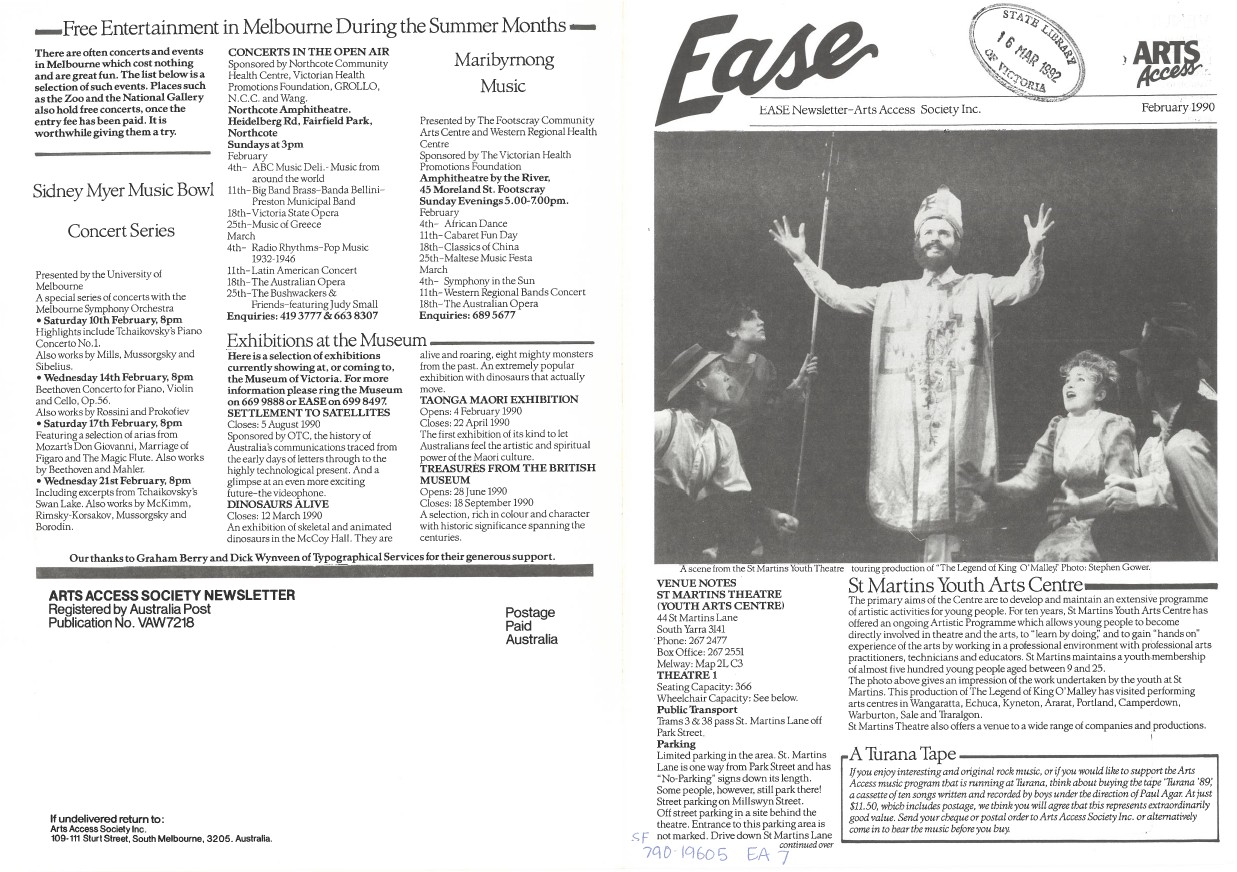 “Arts Access Victoria - Arts Access Society Inc.- EASE Entertainment Access Service Newsletter February 1990” Arts Access Victoria EASE Entertainment Access Service Newsletter February 1990 - Venue notes for St Martins Youth Arts Centre, exhibitions at Museum Victoria, Melbourne Symphony concerts at Sidney Myer Music Bowl
“Arts Access Victoria - Arts Access Society Inc.- EASE Entertainment Access Service Newsletter February 1990” Arts Access Victoria EASE Entertainment Access Service Newsletter February 1990 - Venue notes for St Martins Youth Arts Centre, exhibitions at Museum Victoria, Melbourne Symphony concerts at Sidney Myer Music Bowl
